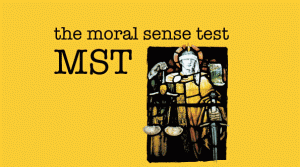Published: February 22, 2011
On a particular visit to Canada from the UK my mum declared me to have low moral standards! Gosh what had I done you may well ask? Before you let your imaginations run wild, she actually was in despair that I allowed my children’s bedrooms to accumulate mess and clutter!
Not what a good girl like me had been brought up to encourage!
Ma I think you confused low morality with ‘less than high standards of tidyiness’ oops mea culpa!
However like most people if asked whether I’d steal, like most I would say no. Would I try to save a drowning person? That depends—perhaps on our fear of big waves which in my case is hampered by being a very bad swimmer! Much research has explored the ways we make moral decisions. But in the clinch, when the opportunity arises to do good or bad, how well do our predictions match up with the actions we actually take? [continue reading…]

Nothing captures human attention more than a moral dilemma. Whether we are soap opera fanatics or not, we can’t help sticking our noses in other people’s affairs, pronouncing our views on right and wrong, justified or not. For millennia, philosophers have speculated about how people make moral decisions, what decisions they make, and what decisions they ought to make. To this rich history of theory the Psychology Department at Harvard University hopes to contribute some data — with your help. Their aim is to use data from the Moral Sense Test,(MST) as well as other experiments, to characterize the nature of our moral psychology, how it evolved, and how it develops in our species, creating individuals with moral responsibilities. The MST has been designed for all humans who are curious about that puzzling little word “ought” — about the principles that make one action right and another wrong.
You have the opportunity to participate in the Moral Sense Test right now. The test is short, and your responses are completely confidential. For more information, read the privacy statement.
Source: Cognitive Evolution Laboratory, Harvard University
Benedict Carey suggests its the situation, not moral character, that often guides behavior in this New York Times feature “Stumbling Blocks on the Path of Righteousness ”
Most people are adamant: They would never do it. Ever. Never deliberately inflict pain on another person, just to obtain information. Ever artificially inflate the value of some financial product, just to take advantage of others’ ignorance. Certainly never, ever become a deadbeat and accept a government bailout.
In experiments as in life, the holier-than-thou effect diminishes quickly when people have actually had the experience they are judging: dubious accounting practices will appear less shady to the person who has had to put a good face on a failing company. And the effect is apparently less pronounced in cultures that emphasize interdependence over individual achievement, like China and Spain.
Link to continue reading
Source: New York Times
Published: November 25, 2008

© iStockphoto
The next time you have to make a difficult moral decision, you might think twice about mulling it over in the bath or shower…
New research in Psychological Science, a journal of the Association for Psychological Science has found that the physical notion of cleanliness significantly reduces the severity of moral judgments, showing that intuition, rather than deliberate reasoning can influence our perception of what is right and wrong. Lead researcher, Simone Schnall, University of Plymouth, explains the relevance of the findings to everyday life; “When we exercise moral judgment, we believe we are making a conscious, rational decision, but this research shows that we are subconsciously influenced by how clean or ‘pure’ we feel.” [continue reading…]


